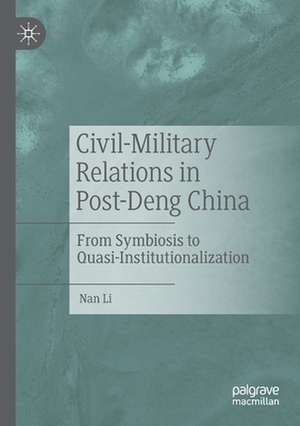Civil-Military Relations in Post-Deng China: From Symbiosis to Quasi-Institutionalization
Autor Nan Lien Limba Engleză Paperback – 3 oct 2021
This book demonstrates that civil-military relations have evolved beyond symbiosis to quasi-institutionalization in post-Deng Xiaoping China.
As the People’s Liberation Army (PLA) is a Leninist party-army, it is commonly assumed that the relationship between the Chinese Communist Party (CCP) and the PLA is symbiotic and institutional boundaries based on a clear functional division of labor are absent between the two. This symbiosis suggests that the primary role of the PLA is in China’s domestic politics; it is to participate in intra-CCP leadership power struggle and in defending the CCP regime against popular rebellions from within Chinese society.
By analyzing major changes in the functions of the PLA political commissar system, the extent of the PLA involvement in the power struggle of the CCP leadership, and the circulation of elites across civil-military institutional boundaries, this book offers a new theoreticalexplanation of civil-military relations in China. It also discusses the implications of the findings for China’s domestic politics and foreign policy.
| Toate formatele și edițiile | Preț | Express |
|---|---|---|
| Paperback (1) | 640.06 lei 6-8 săpt. | |
| Springer Nature Singapore – 3 oct 2021 | 640.06 lei 6-8 săpt. | |
| Hardback (1) | 645.47 lei 6-8 săpt. | |
| Springer Nature Singapore – 2 oct 2020 | 645.47 lei 6-8 săpt. |
Preț: 640.06 lei
Preț vechi: 753.01 lei
-15% Nou
Puncte Express: 960
Preț estimativ în valută:
122.48€ • 130.97$ • 102.12£
122.48€ • 130.97$ • 102.12£
Carte tipărită la comandă
Livrare economică 17 aprilie-01 mai
Preluare comenzi: 021 569.72.76
Specificații
ISBN-13: 9789811564444
ISBN-10: 9811564442
Pagini: 298
Ilustrații: X, 298 p. 3 illus.
Dimensiuni: 148 x 210 x 22 mm
Greutate: 0.41 kg
Ediția:1st ed. 2021
Editura: Springer Nature Singapore
Colecția Palgrave Macmillan
Locul publicării:Singapore, Singapore
ISBN-10: 9811564442
Pagini: 298
Ilustrații: X, 298 p. 3 illus.
Dimensiuni: 148 x 210 x 22 mm
Greutate: 0.41 kg
Ediția:1st ed. 2021
Editura: Springer Nature Singapore
Colecția Palgrave Macmillan
Locul publicării:Singapore, Singapore
Cuprins
1. Introduction: Analytical Puzzle, Literature Review, Central Arguments, And Methodological Considerations.- 2. Evolving Functions Of The Party And Political Work System In The PLA.- 3. The PLA And Intra-CCP Leadership Power Struggle In The Eras Of Mao Zedong And Deng Xiaoping.- 4. Top Leaders And The PLA In The Post-Deng Era.- 5. Circulation Of Elites Across The Civil-Miliary Institutional Boundareis.- 6. Explaining The Evolution Of Civil-Military Relations From Symbiosis To Quasi-Institutionalization In China.- 7. Major Implications For China’s National Security, Political-Military Cooperation, And Inter-Agency Policy Coordination.- 8. Conclusion: Institutional Changes And Possible Role Of The Miltiary In Transition To The Post-Xi Jinping Leadership.
Notă biografică
Nan Li is Visiting Senior Research Fellow at East Asian Institute, National University of Singapore. He has published extensively on Chinese security and military policy and China’s maritime development. He was a professor at the U.S. Naval War College and received a PhD in political science from the Johns Hopkins University.
Textul de pe ultima copertă
This book demonstrates that civil-military relations have evolved away from symbiosis to quasi-institutionalization in post-Deng Xiaoping China.
As the People’s Liberation Army (PLA) is a Leninist party-army, it is commonly assumed that the relationship between the Chinese Communist Party (CCP) and the PLA is symbiotic and institutional boundaries based on a clear functional division of labor are absent between the two. This symbiosis suggests that the primary role of the PLA is in China’s domestic politics; it is to participate in intra-CCP leadership power struggle and in defending the CCP regime against popular rebellions from within Chinese society.
By analyzing major changes in the functions of the PLA political commissar system, the extent of the PLA involvement in the power struggle of the CCP leadership, and the circulation of elites across civil-military institutional boundaries, this book offers a new theoretical explanation of civil-military relations in China. It also discusses the implications of the findings for China’s domestic politics and foreign policy.
Nan Li is Visiting Senior Research Fellow at East Asian Institute, National University of Singapore. He has published extensively on Chinese security and military policy and China’s maritime development. He was a professor at the U.S. Naval War College and received a PhD in political science from the Johns Hopkins University.
Caracteristici
Contributes to the analytical literature on comparative civil-military relations Allows a better and updated understanding of major change in civil-military relations in China Includes implications of this change for China’s domestic politics and foreign policy, and for Asian security
